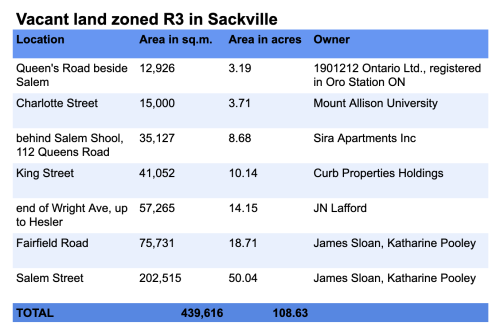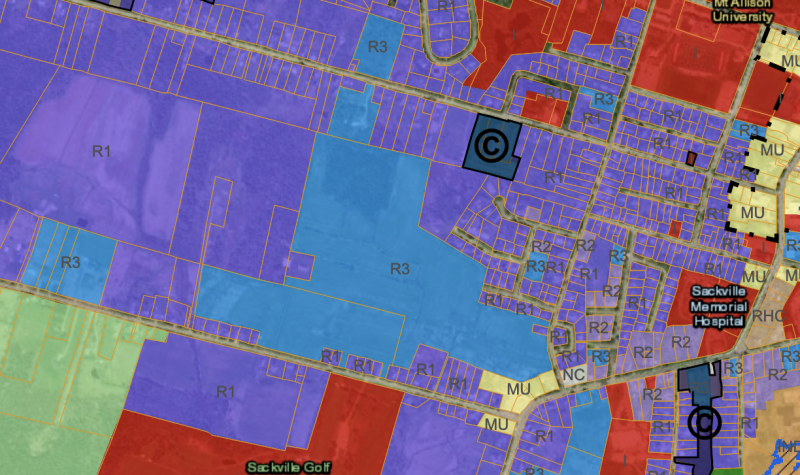Two public hearings on proposed zoning changes are slated to happen at the end of this month, during Tantramar council’s June 27 committee of the whole meeting.
Approval of both changes would make way for a plan by developer John Lafford to build a six-storey building in the back half of the property at 131 Main Street, current home to the historic Joseph F Allison house, built in about 1841.
In order to make his plan work, Lafford is asking council to rezone the back half of the property to R3, the zone for high density residential development in Sackville’s by-law. At the same time, he’s asking council to change the definition of the R3 zone, to increase the height limit for buildings there from 50 feet to 65 feet. Lafford says he needs the extra height to make the math work on the proposed concrete building.
But the change that Lafford is requesting won’t just affect the height allowance on his property at 131 Main Street. It will also change the rules for all properties throughout the former town of Sackville which fall under the R3 zone.
CHMA surveyed the town’s zoning map and identified seven parcels of land in town which are zoned R3, and are not currently home to a building or structure. The seven properties we identified total about 108 acres, and are spread throughout the western side of the town, off Fairfield Road, Queen’s Road, Salem Street, Charlotte Street, King Street, and Wright Avenue.

Data from Service New Brunswick property registry.
In an interview with CHMA after an April council meeting, Plan 360 planner Lori Bickford explained that R3 zones were chosen during a planning bylaw review around 2008. “There was some feedback that said that people didn’t want to go through the rezoning process every time there was an apartment,” recalls Bickford. “So what council attempted to do at that time was take some large parcels that were able to be serviced by both sewer and water and allow them to be pre-zoned to allow as-of-right development without having to go through a lengthy process to rezone a property.”
Some of the R3 zoned properties are much larger than others. The two largest, clocking in at 50 acres and just under 19 acres, with frontages on Salem Street and Fairfield Road, are owned by James Sloan and the late Katharine Pooley, according to Service New Brunswick’s property records.
JN Lafford owns the next biggest R3 property, which stretches between the end of Wright Avenue and Hesler Road. Lafford told CHMA in May that development of this roughly 14 acre parcel will need to wait until the municipality extends Wright Avenue.
“We need a road, a municipal road to get through there, so we can put housing on it,” said Lafford. “So that’s kind of why we haven’t started there yet.”

A detail from Sackville’s zoning map south of exit 504, with R3 zones in blue.
Two other sizeable properties fronting on King Street and Queen’s Road are owned by Curb Property Holdings and Sira Apartments Inc. Curb Property Holdings has two registered directors, Pierre Basque and Jason Hamilton, both of Dieppe. Curb currently owns and operates a number of Sackville apartment buildings, including 21 and 23 Main Street. According to provincial records, Sira Apartments Inc. is owned by Luc Leblanc, based in Dieppe and Shediac.
The two smallest remaining properties, each between three and four acres, are owned by Mount Allison University and a numbered Ontario company.
“Some of these large parcels could be further subdivided into other properties,” says Bickford. “Anything that’s pre-zoned R3, you could see that those can be developed as high density.”
The property that is the subject of the requested height change to the R3 zone is much smaller than any other R3 properties in Sackville. Lafford is hoping to rezone 1.3 acres of his 2.3 acre property at 131 Main. But the zoning change he has applied for will apply to all R3 zones in the municipality.
Bickford says that site-specific development agreements, to allow for changes applying only to one property, are not currently allowed under Sackville’s municipal bylaw, but council could change that in future if it so decided.
“Previously, when we used to do R3 zones, every one had to be done by a development agreement,” says Bickford. “And every one was a site specific scenario. And then we would attach an agreement to it. We moved away from that model back in the 2008-2016 range. The purpose of that was to remove that barrier, which was looked at as an extra layer that was complicating that process.”
Under the current system, someone can build a multi-unit building up to 50 feet high as-of-right, meaning without any special agreement or permission from council.
Lafford told CHMA in May that he didn’t think the additional height allowance that he’s asking for, to allow for 65 foot high buildings in all R3 zones, would mean more six-storey developments being built in town.
“It’s one thing to be able to do something, but will you do it?” said Lafford. “Will somebody build six-storey buildings in Sackville? I don’t know. It’s totally up to them. We feel very confident on our business plan in Sackville to do this. But I don’t know how many other people would feel confident… I can’t speak for anybody else.”
The R3 zone is not the only zone which allows for high density residential development. The R2 zone allows for small buildings with up to six units, and the Mixed Use zone, which covers much of downtown, allows for multi-unit residential development limited to 50 feet in height, similar to the current R3 zone.
The public hearings on the two zoning changes requested by John Lafford take place on June 27, at 3pm during Tantramar council’s next committee of the whole meeting.
Correction: A previous version of this story identified one 3.5 acre property on Charlotte Street as vacant in error. The story and chart have been edited to reflect correct information. June 8, 2023, 8:30am


